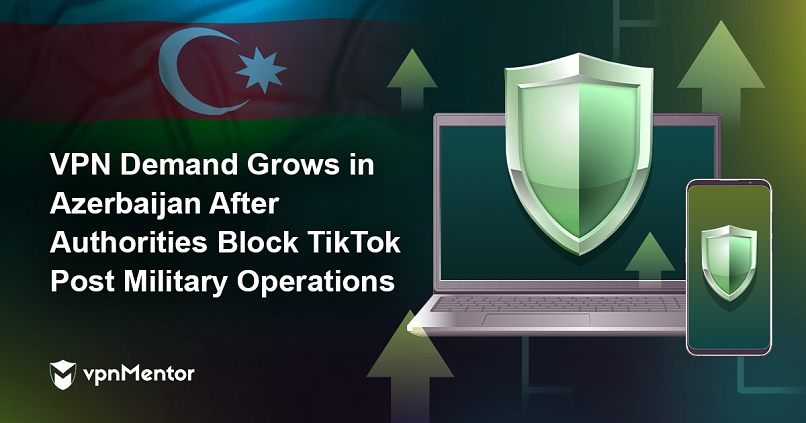VPN Demand Surges in Azerbaijan After Authorities Block TikTok Post Military Operations

The demand for VPNs in Azerbaijan shot upward following a temporary TikTok ban enforced by the local government. The restriction came after the country launched military offensives against Nagorno-Karabakh on September 19.
Nagorno-Karabakh is a landlocked region within Azerbaijan’s territorial borders but is populated with ethnic Armenians who renounce Azerbaijan’s authority. The two nations have been in conflict for the past century in a dispute that spans territory, religion, and culture.
Russia has long been the power broker in the Azerbaijan-Armenia conflict, with the two countries being former members of the Soviet Union. However, Russia’s failure to intervene during the recent flare-up raised uncertainty among the international community about its capability to continue managing tensions, especially amid the ongoing war with Ukraine.
Azerbaijan called the most recent attack on Nagorno-Karabakh an “anti terror” operation that aimed to force the Armenian fighters to lay down their weapons. This sudden and bloody onslaught, which reportedly claimed the lives of hundreds, caused widespread alarm in the international community.
Seemingly in anticipation of the online and media buzz the military action would generate, access to the video-sharing platform TikTok was restricted in Azerbaijan in the early morning of the day of the attack.
Later, the country’s Cyber Security Service confirmed the temporary suspension, saying that it was to curtail the spread of disinformation. The Media Development Agency also released a statement advising journalists against publishing unverified or unofficial information about the offensive.
The TikTok ban was lifted on September 21, a day after Armenian fighters agreed to disband and disarm, signaling a ceasefire.
VPN Demand Surge in Azerbaijan
The temporary TikTok restriction caused a spike in VPN demand in the region. Upon analysis of user search data, vpnMentor saw a 324% hike in VPN searches in Azerbaijan compared to previous periods.
The graph below shows the upshoot in “VPN” searches, peaking on the day of the attack.

Previous Social Media Restrictions in Azerbaijan
Azerbaijan previously suspended access to TikTok in September 2022 following violent clashes in Nagorno-Karabakh. It cited the same reasons — preventing the dissemination of false information and protecting national security — in a statement released two days after the military confrontation. The incident spurred a sudden increase in VPN demand in both Azerbaijan and Armenia.
A similar occurrence was recorded in 2020. Azerbaijan temporarily banned several social media outlets (including Facebook, Instagram, WhatsApp, Twitter, and YouTube) after tensions escalated in September. VPN providers reported a quick upsurge in sales following the restriction.
Past VPN Demand Growths Due to Military-Conflict-Related Censorships Worldwide
Unexpected and violent military operations have always triggered proportionate public feedback, often on a global scale. As the world turns to a largely digital presence, social media has increasingly become a part of the equation. Consequently, governments and military bodies have tried to keep the situation under control by attempting to regulate online information dissemination. In most of these instances, citizens have turned to VPNs to circumvent the censorship.
In February 2022, Russia banned Instagram, which led to an 11,000% increase in VPN installations within a month. The restriction was a reaction to Meta’s decision to allow content that incited violence toward Russian soldiers following the country’s invasion of Ukraine. Despite Meta’s policy against hate speech, it explained that it is “unacceptable” to remove ordinary Ukrainians’ expression of “resistance and fury at the invading military forces.”
A similar incident was recorded in February 2021, when Myanmar’s military disrupted internet connectivity and restricted Facebook access after staging a coup. The publicized justification was to “maintain stability.”
Connection interruptions and social media bans have continued since, causing regular spikes in VPN demand in Myanmar. In response, the military junta declared in 2022 its plan to criminalize the use of VPNs, with a possibility of a 3-year imprisonment for any citizen caught using such services.
vpnMentor neither encourages nor condones using VPNs for illegal activities, such as bypassing laws or regulations.



Please, comment on how to improve this article. Your feedback matters!